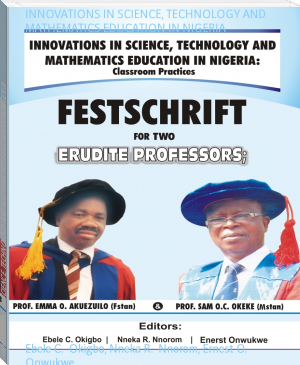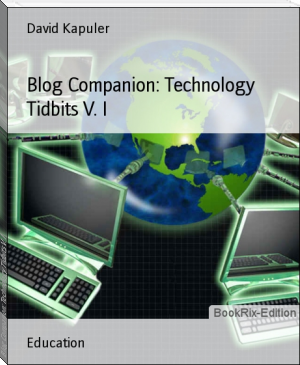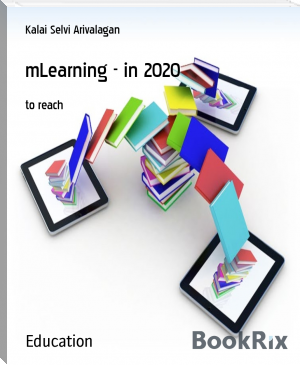INNOVATIONS IN SCIENCE, TECHNOLOGY AND MATHEMATICS EDUCATION IN NIGERIA, Ebele C. Okigbo, Nneka R. Nnorom, Ernest O. Onwukwe [best reads .TXT] 📗

- Author: Ebele C. Okigbo, Nneka R. Nnorom, Ernest O. Onwukwe
Book online «INNOVATIONS IN SCIENCE, TECHNOLOGY AND MATHEMATICS EDUCATION IN NIGERIA, Ebele C. Okigbo, Nneka R. Nnorom, Ernest O. Onwukwe [best reads .TXT] 📗». Author Ebele C. Okigbo, Nneka R. Nnorom, Ernest O. Onwukwe
Keywords: Instructional Strategy, ICT, Innovation, Academic Performance and Mathematics
Introduction
Globally, education is an avenue through which nations of the world attain globalization. Undeniably, education is one of the instruments used in developing the economic, well-being of humans and overall transformation of the nation. One can infer that, education is a combination of deliberate teaching and learning activities with effects on the intelligence, character formation and behavioural patterns of learners. Teaching and learning are the major activities in a country’s educational system. Nigeria education is divided into various levels which includes; pre-primary, primary, secondary and tertiary education. Primary education is a spring board from which other levels of education take off.
According to the Federal Republic of Nigeria (FRN, 2013), primary education is referred as the education given in an institution for children aged six to eleven years plus. The primary level of education is considered all over the world to be the most important level of education being a foundational level. The Federal Republic of Nigeria in her National Policy on Education put it more succinctly by stating that “since the rest of the education system is built upon it, the primary level is the key to the success or failure of the whole system. Primary education therefore forms the basis for a child’s ability or inability to function well at post-primary levels. The objectives of primary education include; inculcating permanent literacy, numeracy and ability to communicate effectively, lay a sound basis for scientific, critical and reflective thinking among others. In pursuance of these objectives, the Federal Government made primary education compulsory, free, universal and qualitative. The core subjects taught at the primary school level are English Studies, one Nigerian Language, Mathematics and Basic science and Technology. Mathematics forms the major and core subject that a pupil has to offer in primary school.
Mathematics is the science of numbers and shapes. Mathematics is not only considered as an important subject in all the levels of education but also regarded as the father and queen of all science subjects. It is a practical subject used to solve personal and social problems. Mathematics is a practical subject that deals with the counting and measuring of numbers. Mathematics, according to Gouba (2008) deals with logical reasoning and quantitative calculations. Mathematics is a body of knowledge essential for the achievement of scientific and technological nation (Anaduaka & Okafor, 2013). The authors further maintained that, the knowledge of mathematics promotes the habit of accuracy, logical, systematic and orderly arrangements of facts in the affairs of an individual. The importance of mathematics does not only lie in its contributions to scientific and technological development but also in its utility in day-to-day interactions at the market places, transportations, business of all sorts by both literate and illiterate members of the society (Golji & Dangpe, 2016).However, there seems to be a negative attitude among pupils towards Mathematics in primary schools due to teaching methodologies adopted by teachers. The primary purpose of teaching is to bring a fundamental change in the learner and this change cannot occur if teachers do not employ varieties of instructional strategies in teaching (Tebabal & Kahssay, 2011).
Instructional strategy is seen as strategy by which a teacher delivers his/her subject matter to the learners based on predetermined instructional objectives in order to promote learning. Teaching strategy is a general plan which includes all the parts of the teaching situation; namely: the objectives, teaching methods, teaching aids and evaluation strategies (Pei-Shi, 2012). Norman (2011) posited that teaching strategies involve the use of all instructional materials, facilities and other resources available to an educator in order to meet the instructional needs of all learners and enable learners’ progress from dependent to independent learners.
The traditional teaching strategy usually employed by primary school teachers is filled with too much talking and writing which make pupils to fear and have some sort of phobia towards learning Mathematics. The traditional teaching strategy is an instructional setting where teachers mainly use textbooks and solve problems on the chalkboard without actively engaging pupils in the course of solving mathematical problems. While teachers are active, pupils are mainly passive and copy solutions provided by their teacher without taking responsibility for their own learning. This kind of teaching approach creates an idea in the mind of pupils that Mathematics is difficult subject and cannot perform better in the subject. Correspondingly, Ayhan (2011) averred that, the passivity of pupils in this teaching approach also makes Mathematics even more complicated as pupils cannot analyze questions and answer questions on their own.
Ideally, the counting and measuring of numbers in Mathematics makes the subject a brain tester. Thus, one can infer that, effective teaching and learning of Mathematics can sharpen one’s logical thinking through the use of Information and Communication Technology. Information and Communication Technology(ICT) is a generic term referring to technologies that are used for collecting, storing, editing and passing information in various forms. Although this definition seems to be precise, ICT is seen as any device that can collect, edit and transmit information from one end to another. Eke and Nweke (2010) sees ICT as a whole range of technologies involved in information processing. It is as well as handling and processing of information by means of electronic and communication devices such as computer, cameras, telephones, televisions, radio, projectors, internet and multimedia among others. Nzewi (2009) sees ICT as a scientific method of sharing, exchanging and sending or moving information from one place to another. From the researcher's opinion, ICT is the process of using technological devices to acquire process, store and disseminate information from one place to another for the purpose of acquiring knowledge for individual development and that of the society at large. Examples of technology are software programs, flash Drive, CD-ROMS, computers, projector, telephone, television set, radio set, and graphic calculator among others. In today’s knowledge oriented society, mathematics teaching is increasingly connected to innovation.
Innovation can be broadly thought of as new ideas, new ways of looking at things, new methods or products that have value. Innovation contains the idea of output, of actually producing or doing something differently, making something happen or implementing something new. In the context of education, Des-Hewitt and Tarrant (2015) asserted that, innovation is all about empowering teachers to develop intelligent, creative and effective teaching methods that will challenge and engage their learners. This implies that innovation entails the development of innovative strategies for teaching and learning which could benefit learners and improve their problem solving skills.
Innovation, particularly on the teaching and learning of Mathematics involve the use of novel instructional strategies such as the use of ICT tools or devices in teaching and learning Mathematics in the best and the most effective way. This innovative instructional strategies help to facilitate the implementation of pupils-centered pedagogy and the ownership of learning by learners being actively involved in the teaching and learning processes. Pupils could learn mathematics in an effective and entertaining setting that is suitable for their kind of intelligence and learning styles. It is believed that when a teacher uses ICT as an innovative instructional strategy for teaching mathematics, pupil’s academic performance tends to improve.
According to Kathryn (2010), academic performance relates to academic subjects a child studies in school and the skills the child is expected to master in each subject. Academic performance refers to how well a learner is accomplishing his or her tasks and studies (Scortt, 2012). Academic performance of a child could be defined as the learning outcomes of the child. It is multidimensional and is intricately related to human growth and cognitive, emotional, social and physical development. Thus, making teachers become facilitators and no longer instructors in the classroom (Burke, 2007).Due to the effects of globalization, ICT is becoming increasingly important for the development of the 21stcentury knowledge society. It contribute to economic prosperity as well as to social, education and individual wellbeing and are essential factors for a more competitive and dynamic society (Babalola, Ibitoye & Efuntayo, 2006). The problem of this study therefore is that, teacher perception of ICT as an innovative instructional strategy for improving pupils academic performance in mathematics of Anambra State is not clearly known. Again, there seems to be paucity of empirical investigations on this regard in Awka South L.G.A. Hence, the researchers deemed it necessary to find out teachers perception of ICT as an innovative instructional strategy for improving pupils academic performance in mathematics.
Purpose of the Study
This study was principally aimed at investigating teachers’ perception of ICT as an innovative instructional strategy for improving pupils’ academic performance in mathematics in Anambra State. Specifically, the study sought to:
Find out the perception of primary school teachers on the importance of using ICT to teach mathematics to pupils in Awka South L.G.A.
Determine the competency level of primary school teachers in the use of ICT in teaching mathematics to pupils in Awka South L.G.A.
Research Questions
The following research questions guided this study;
What are the perceptions of primary school teachers on the importance of using ICT to teach mathematics to primary school pupils in Awka South L.G.A?
What are the competency levels of primary school teachers in the use of ICT in teaching mathematics to pupils in Awka South L.G.A?
Method
This study adopted a descriptive survey design to determine teachers’ perception of ICT as an innovative instructional strategy for improving pupil’s academic performance in mathematics. The area of the study was Awka South L.G.A of Anambra State. Two research questions guided the study. The population of the study comprised of 665public primary school teachers in Awka-South L.G.A. Using simple random sampling technique (balloting without replacement), 200 teachers were selected from the population. Data were collected using 20 items questionnaire developed by the researchers titled: ICT as an Innovative Instructional Strategy for Improving Pupils Academic Performance in Mathematics (IIISIPAPM). Face validity of the instrument was determined by three experts. Cronbach alpha was used to obtain reliability coefficients of 0.74 and 0.79 for the two clusters of the instrument with an overall coefficient of 0.77. A4-point rating scale of Strongly Agree(SA- 4 points), Agree (A-3 points), Disagree (D- 2 points) and Strongly Disagree (SD – 1 point) was used to collect data for the study. The data collected were analyzed using weighted mean (x) to answer the research questions and standard deviation to determine the homogeneity or not of respondents mean scores. In analyzing the mean (), value of 2.50 and above were regarded as agreed while those value below 2.50 were regarded as disagreed
Results
Research Question 1: What are the perceptions of primary school teachers on the importance of using ICT to teach mathematics to primary school pupils in Awka South L.G.A?
Table 1: Mean Ratings of Primary School Teachers’ Perception on the Importance of Using ICT to Teach Mathematics to Primary School Pupils in Awka South L.G.A.
S/N
Items
Mean ()
SD
Decision
Pupils understand more when ICT is used to teach them any mathematical concept.
3.13
0.63
Agreed
ICT enhances co-operative learning among pupils.
3.23
0.27
Agreed
The use of ICT in





Comments (0)